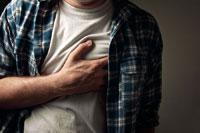
- posted: Jul. 19, 2016
Frequent heartburn can be a symptom of a common condition called GERD. Saeed Ahmad, MD, your Wesley Chapel gastroenterologist at Digestive Disease Associates of Central Florida, is here to describe GERD symptoms and explain treatment options.
What is GERD?
Gastroesophagheal reflux disease (GERD), also called acid reflux, occurs when stomach acids leak back into the esophagus from the stomach. The problem often occurs when the esophageal sphincter, a ring of tissue that serves as the separation between the stomach and the esophagus, is weak or doesn't close completely. The esophagus is the tube that connects your throat to your stomach.
What are common symptoms of GERD?
You may experience any of the following symptoms if you have GERD:
- Heartburn
- Burning sensation in the throat
- Chest pain
- Sour taste in your mouth
- A lump in the throat feeling
- Coughing
- Difficulty swallowing
- Hoarseness
- Asthma
- Food regurgitation
How can I reduce GERD symptoms?
Certain foods and beverages, including onions, tomatoes, citrus fruits, fatty or fried foods, peppermint, spicy foods, chocolate, alcohol and caffeinated or carbonated drinks can worsen symptoms and should be avoided. Symptoms can become worse when you lie down. If you suffer from GERD, it's a good idea to avoid lying down two to three hours after you eat. Raising the head of your bed six inches can also help you avoid uncomfortable reflux symptoms.
Eating five or six small meals, instead of three large meals, is recommended if you have GERD, as is losing weight if you are overweight. When you're overweight, those extra pounds can press on your stomach, forcing acids into your esophagus. Giving up smoking can improve your symptoms because smoking can affect the way the esophageal sphincter works.
How can a gastroenterologist help me?
Your Wesley Chapel doctor can recommend over-the-counter medications, such as antacids and proton pump inhibitors, to help relieve your symptoms. If these medications aren't effective, prescription-strength medications may be needed. In severe cases, surgery may be recommended to strengthen or reinforce the esophageal sphincter.
If you experience frequent heartburn or other symptoms of GERD, your gastroenterologist can help you prevent or reduce these unpleasant symptoms. Call Saeed Ahmad, MD, your Wesley Chapel gastroenterologist at Digestive Disease Associates of Central Florida at (813) 994-4800. Don't let GERD stop you from enjoying life!